 |
| Download pdf file | Newsletter archives | |||
| Dieser Newsletter auf Deutsch | Cette newsletter en français | |||
1. Brexit: Populism meets reality |
 |
|
The United Kingdom to remain full member of EU - for an indefinite period
In a non-legally binding referendum, held on 23 June 2016, a narrow majority voted to leave the EU. However people in Scotland, Northern Ireland and Greater-London wish to remain in the EU. Up to now it still remains totally unclear, as to how and when the EU withdrawal is to take place.
The withdrawal procedure begins with a request under article 50 of the Treaty on European Union, which specifies a two year period of negotiations for withdrawal. Membership only ends following this period. So far this request has not been triggered. This is due to political, economic and legal issues. There are currently two court cases underway which are blocking any such request for the time being.
Each of these legal cases has the potential to stop Brexit. There is neither a majority for a withdrawal from the EU in the House of Commons in London, nor in the Parliament in Belfast. Furthermore, members of the British House of Lords have announced that they will use all possible means to block article 50 for as long as possible.
Brexit signifies the disintegration of the United Kingdom
Scottish government is preparing for a second independence referendum and began discussions with EU authorities on Scotland remaining in the EU. There were also demonstrations for independence in Wales and for remaining in the EU. A petition in London is demanding its independence as a city state such as Singapore, enabling them to remain an EU member.
The new Prime Minister, Theresa May wants to trigger article 50 only once "a UK-wide approach" to the negotiations with the EU had been agreed. It still remains totally unclear what this approach looks like. Some politicians are pushing for a "hard Brexit", while others want to follow the Norwegian model and stay within the European Single Market. The opposition is demanding a second referendum on the terms of the Brexit or early parliamentary elections. On 2 October 2016, the date initially announced for triggering withdrawal was shifted from end 2016 to the end of March 2017. There are growing signs that the Brexit may be further postponed and possibly, never even happen.
What's in store for European works councils?
Does the Brexit have any legal consequences for European works councils, SE works councils or Special Negotiating Bodies? At the conservative party convention held in Birmingham, government members declared on 2 October 2016, that the currently applicable labour legislation would not be touched. If this promise is kept, then current British EWC legislation (TICER 2010) would also remain unchanged. The EWC Academy has put together the most important information on a Brexit website.
Brexit Dossier for European works councils
Forthcoming event
A British political advisor will report on the current situation after the Brexit referendum at the annual EWC conference in Hamburg, on 30 January 2017.
|
 |
2. Swissexit: Populism meets reality |
 |
|
Risk of Guillotine clause for Switzerland?
In order to benefit from advantages of the single market, Switzerland had concluded comprehensive bilateral agreements with the EU in 1999 and 2004. In this way, a major part of EU legislation has been transposed into Swiss national legislation. In order to prevent Switzerland from "cherry picking", these treaties are interconnected by a "Guillotine clause": even if one tiny part of any agreement is terminated, six months later all the others are automatically cancelled. Consequently, if there is no agreement with the EU on freedom of movement of persons, on 9 August 2017 a tariff wall will be built all around the Confederation. Switzerland would then have its "Swissexit" and have to completely re-negotiate their relationship with EU, which would take years. From that day on, border controls would also be re-established just as prior to Switzerland joining the Schengen agreement in December 2008 (see report in EWC News 3/2008).
RASA Popular Initiative website
Poker game in the Croatia issue
Bilateral agreements between Switzerland and the EU were automatically extended to cover Croatia, following its accession to the EU on 1 June 2013, excepting the one on freedom of movement of persons. Switzerland had negotiated a temporary agreement with Croatia, but never ratified it. After the referendum on 9 February 2014, it wanted to postpone dealings on the Croatia Protocol until a general solution was reached on immigration policy with the EU. As a consequence, the EU initially excluded Switzerland from the research program, Horizon 2020. This is considered to be the world's most important program for innovation with a budget of 80 billion €.
An emergency solution was however found at short notice. Since 1 July 2014, Croatian citizens in Switzerland are being treated just like the citizens of any other EU-Member State - as if the Croatia Protocol had already been ratified. In return, the EU is provisionally granting Switzerland the right to participate in Horizon. Nevertheless, if the Croatia Protocol is still not ratified before the end of 2016, Switzerland will finally be excluded from the research program, on 1 January 2017. Switzerland signed the Croatia Protocol on 4 March 2016 in Brussels, however it will only come into force once the EU renounces the termination of bilateral agreements.
No changes for European works councils
The Directive on European works councils does not apply to Switzerland. It is not included in any of the bilateral agreements and the Swiss Parliament declined to voluntarily transpose it, in June 2012 (see report in EWC News 2/2012). Altogether 110 Swiss companies with subsidiaries within the EU, are subject to this Directive, of which 50 have already established a EWC. Over 70% of them have integrated representatives from Switzerland, although they are not legally obliged to. These figures come from a research project at the University of Zurich.
Research project on European works councils in Switzerland |
 |
3. Posted Workers Directive: Criticism from Eastern Europe |
 |
|
European Commission pushing for reform
If one third of national parliaments invoke the so-called subsidiarity control mechanism ("yellow card"), the European Commission must examine the objections and decide whether to maintain, amend or withdraw the proposals giving reasons for the decision. However, the main reason behind the criticism is not a violation of the principles of subsidiarity, but the political refusal of the whole project.
European Commission press release Example: objections from the Polish parliament Press report on the political background
Differences in wages between the West and East are the main cause
The European Commission had submitted its suggestions on reforming the EU Directive from 1996, on 8 March 2016. It aims at ensuring the same pay for the same job at the same place. Mobile workers across Europe should be protected from exploitation.
Between 2010 and 2014, the number of postings within the EU rose by around 45%. In 2014, 1.9 million workers were posted into other member states, mostly to Germany, France and Belgium. The major part of them come from Poland. In future they should have a legal right to the normal working conditions of the host country whereas at present they are only entitled to the minimum wage. The East European countries see this as a threat to the "competitive advantage" of paying lower wages.
European Commission propositions in detail
The issue has already landed several times in the courts. In December 2007, the European Court of Justice in Luxembourg ruled on two cases (see report in EWC News 4/2007). In 2003, Viking Line, a shipping company operating a Baltic Sea ferry reflagged from Finland to Estonia and replaced the crew by lower paid workers. In 2004, Laval, a company from Latvia, constructed school buildings near Stockholm and paid its Latvian employees Latvian wages. In both cases trade unions organized labour disputes and boycott measures. The issue that came before the courts was whether a labour dispute can force foreign companies to apply the prevailing local collective agreements, under EU legislation.
The highest labour court in Denmark condemned a German company in February 2014, to apply Danish collective agreements and to pay higher wages retroactively. The German company had hired Polish painters and posted them to Denmark to renovate a hotel (see report in EWC News 1/2014). In March 2013, the Belgian government filed a complaint with the European Commission against social dumping in German slaughterhouses, caused by the low wages of East European contractors (see report in EWC News 2/2013). |
 |
4. Labour disputes on production sites and mergers |
 |
|
On 2 September 2016, Caterpillar, the manufacturer of construction equipment announced its plan to close the Charleroi plant (Belgium) for April 2017. 2,200 employees manufacture excavators on the site where 1,400 jobs had already been lost in 2013. The remaining staff had accepted pay cuts in order to save their jobs. Caterpillar was able to make 4 million € profit at this site in 2015.
Production came to a standstill for one week following the announcement. The news caused quite a stir politically in this structurally weak region with 12% unemployment, since an additional 5,000 jobs are also threatened in the supply-chain. The European Commission in Brussels established a Task Force and the Belgian parliament convened an extraordinary session. Caterpillar management however refused to discuss with members of parliament and would only accept the local works council and trade unions as interlocutors.
The special "Procédure Renault" was initiated, on 22 September 2016, in an extraordinary meeting of the works council. This is an information and consultation procedure for mass redundancies which was introduced in 1998 after the closure of the Renault plant in Vilvoorde near Brussels and is based on an EU Directive. The Belgian employment minister, Kristiaan Peeters, suggested to make this law stricter, on 29 September 2016. The EU Directive could hereby possibly be put back on the political agenda. A planned revision had failed in summer 2015 (see report in EWC News 4/2015).
Trade union press release on plant closure Pan-European trade union strategy at Caterpillar Analysis: the Caterpillar case and EU labour law
On 7 September 2016, central management of Alstom announced plans to close its Belfort plant with 480 workers, for 2018. The factory is considered as the heart of the French railway industry. Locomotives have been manufactured in the city which is situated between Alsace and Burgundy, since 1879 and include today the main power modules for the French high-speed TGV train.
The announcement caused a lot of political concern and led to the intervention of the president. After two weeks of intensive discussions with the government on 2 October 2016, an alternative plan was reached which is to safeguard the site. The government will finance additional orders for the national railway, SNCF. The extraordinary meeting of the European works council, planned for the 4 October 2016 to initiate the information and consultation procedure on the plant closure, was called off. The transport division has had a new EWC agreement in place since November 2015, following the sale of Alstom's energy division to General Electric (see report in EWC News 4/2015).
Largest brewery merger in the world: EWC warns of risks
Anheuser-Busch InBev has its headquarters in Brussels and sells brands such as Beck's, Budweiser, Stella Artois, Corona and Löwenbräu. SABMiller's headquarters near London are soon to be closed. It originates from South Africa and Australia with brands such as Miller or Foster's and has a strong presence in developing countries. The East European breweries are to be sold.
The opinion of the SABMiller EWC describes the merger as a hostile takeover. The corporate culture of AB InBev will be a culture shock for SABMiller's European Business units and a threat to jobs and working conditions. SABMiller has a EWC in place since 2006, under Hungarian jurisdiction. AB InBev has had a EWC under Belgian jurisdiction since 1996. During the transition period both will continue to operate in parallel, whereby the EWC of SABMiller will be heavily involved in the sale of the Central and East European subsidiaries.
|
 |
5. Current legal proceedings |
 |
|
Extraordinary meetings of the European works council were refused on two occasions in 2015: in the context of a plant closure in Gunskirchen, Upper Austria and later for the acquisition of seven French production sites. Central management was only prepared to inform the EWC through video conference with subordinate managers and not with the management board. Furthermore, in the opinion of central management, the acquisitions would not have any negative effects on employees, as opposed to plant closures, and therefore not represent exceptional circumstances in the sense of EWC legislation.
The EWC finally decided to take legal action, since its information and consultation rights had already been systematically violated for years, e.g. with the closure of the Liverpool plant in the year 2012 (see report in EWC News 2/2012). Central management reacted to the legal action by terminating the EWC agreement on 29 June 2016. It continues to apply however until the end of 2017. The following three issues which are of fundamental importance to all European works councils, have now to be clarified in court:
1. Does a video conference fulfill the requirement for an extraordinary meeting? 2. Who is the EWC's interlocutor, the management board or subordinate management levels? 3. Does the acquisition of plants represent exceptional circumstances in the sense of EWC law?
Forthcoming event
The EWC chairman of Mayr-Melnhof will give a report on the current state of the court case at the EWC conference to be held in Hamburg, on 30 January 2017.
Which court is competent for SE legal proceedings?
In addition, the issue is particularly critical since employee representatives only have a right to one third of the seats on Zalando's supervisory board, whereas there was already a legal right to full-parity codetermination at the time of the SE conversion. The entry of a SE into the trade register becomes effective at the end of the negotiations with the SNB. The Berlin labour court is of the opinion that a civil, not a labour court is competent for legal disputes concerning the improper registration of a SE.
Apart from this issue of jurisdictional competence, the case is of utmost importance for SE legislation and Corporate Governance in companies with codetermination. EWC law is also indirectly concerned. Namely, there is still no case-law concerning the consequences of an incorrectly established SNB.
Background information on the legal case Report on Zalando's SE works council
On 15 July 2016, the labour court in Berlin ruled on a filing from the German works council of Groupon to establish a "default" EWC. This e-commerce company from Chicago has over 10,000 employees worldwide. The German and French works councils had requested the establishment of a EWC on 22 July 2015. Although the employer did acknowledge receiving the request, no action was taken within the following six months. There was no invitation to a meeting of the Special Negotiating Body (SNB).
Subsequent to expiration of this deadline, on 17 February 2016 the German works council informed the employer that a default EWC was to be established and proceeded to elect one EWC member. The employer was however of the opinion that the deadline in question was not six months, but three years. He had communicated in writing his wish to negotiate. The court was of the opinion that an exchange of correspondence was insufficient, and there also needs to be proof of concrete steps taken for the convening of a SNB. If no action is taken by central management within six months, a default EWC has to be established. Groupon was therefore obliged to immediately convene the constitutional meeting of the EWC.
One side effect of this ruling: Groupon is no longer free to decide under which national jurisdiction the EWC is to be established. If the management would have reacted sooner, they could have chosen another subsidiary within the EU, e.g. a British site. The court however has now defined that German law is applicable in this case and that the EWC has its headquarters in Berlin. |
 |
6. Newly established European works councils |
 |
|
New British EWC despite Brexit referendum
The Special Negotiating Body (SNB) was established on 4 April 2016 and was able to achieve a result in just under three months. The new EWC agreement is largely modeled on the Donata Holding SE agreement which was concluded in 2007 under German jurisdiction establising a SE works council that is now to be dissolved. There was a legal dispute on consultation rights in 2012, which remains until today, the only case of SE litigation in the whole of Europe (see report in EWC News 1/2012). Coty had a EWC in place on a "voluntary" basis, which was not subject to the EU Directive, from 1996 to 2007.
The new EWC has 24 members from 18 countries, including Switzerland and Monaco. There is one annual plenary meeting with the management and a second internal meeting. The six-member select committee meets three times per year. The consultation procedure is well structured with specified deadlines. As is typical under SE legislation, to settle any disagreements, there are provisions for a second round of consultations which have been directly transposed from the SE agreement. The EWC members have access to all Coty sites in Europe after due justification.
Italian infrastructure service provider establishes EWC
US defense group establishes EWC under British jurisdiction
One plenary meeting is held per year in Brussels. Besides typical EWC topics, there are discussions on corporate social responsibility, environmental protection, equal treatment as well as occupational health and safety. The select committee is composed of only three members from three countries. It is consulted under exceptional circumstances if either the whole company or at least 150 employees in two countries are concerned by restructuring measures, within a period of 120 days. Fixed deadlines have been specified: two weeks for central management to communicate information to the EWC and ten days to render an opinion following an extraordinary meeting. The written reply from management to the EWC then completes the whole procedure. |
 |
7. Updated EWC agreements |
 |
|
Revised Polish EWC agreement
The EWC was established in December 2011 and falls fully under the scope of the new EU Directive. The revision of the EWC agreement is a consequence of the closure of a paper plant in Germany (Mochenwangen, Baden-Wuerttemberg) at the end of 2015. After the loss of two German mandates, the EWC is now composed of seven members: three each from Sweden and Poland and one for the sales offices. Two plenary meetings are held per year mainly in Poznań or Gothenburg. In accordance with Polish legislation, the EWC receives a budget to cover all its operating costs. An annual budget of 25,000 € was specified in the EWC agreement. Additional means can be granted under exceptional circumstances.
In the future, the 83,000 employees in Europe will be represented by 24 delegates (previously 20). For the first time, Austria, Belgium and Romania have a seat and Serbia has observer status. Apart from Italy, which has eight members, the largest countries are Poland with four representatives as well as Germany and France with two each. Plenary meetings are held once annually. The select committee has six members and the chairperson is always nominated from Italy where there is also the EWC secretariat. The utility vehicle production which was spun off from the Fiat-group in 2010, established their own EWC in November 2015 (see report in EWC News 4/2015). |
 |
8. New SE conversions |
 |
|
Failed SE negotiations
Central management showed little willingness to compromise during the discussions with the Special Negotiating Body (SNB), in which IG Metall trade union officers were also involved. As a consequence, there was no agreement on SE participation signed before the expiration of the legal negotiation period of six months. The standard rules of the SE Directive are then automatically applicable. This is the second case where SE negotiations have failed after Rheinische Kunststoffwerke in October 2008. On 11 April 2016, a "default" SE works council was established at the yacht builder’s headquarters.
Report on the constitutional meeting
Mail-order Company avoids board-level employee representation
The constitutional meeting of the Special Negotiating Body (SNB) was held on 22 February 2016 in Munich with 13 members, including nine from Germany, two from Czechia and one each from Italy and Spain. A SE participation agreement was concluded on the very same day (probably based on a text unilaterally prepared by the employer), which permanently excludes employee participation on the supervisory board. There was similarly such a short period of negotiation at the software developer, GFT Technologies in Stuttgart, in December 2014 (see report in EWC News 2/2015).
Very restrictive rules apply to the Windeln.de SE works council: it is only competent if more than 10% of the European workforce is affected by measures. Only one of its members has a right to training, and moreover, only then if the necessary expertise cannot be acquired elsewhere, e.g. by technical literature. The annual plenary meeting and Steering Committee meetings take place as telephone or video conferences. A meeting in Munich can only be convened after explicit agreement from central management. At present, the company remains relatively modest with scarcely 600 employees in Europe. However, the SE agreement will continue to apply if they make large scale acquisitions of mail-order companies in other EU Members States, which the central management and the financial investors are explicitly aiming to achieve through the IPO.
Press release on SE conversion
Family business avoids full-parity supervisory board
On 8 June 2016, an SE participation agreement was concluded for Wittenstein. This family business based in Igersheim (Baden-Württemberg) produces mechanical transmission systems. There are over 1,600 workers in Germany in eight locations with an additional 200 due in coming months. A full-parity supervisory board is legally compulsory in Germany starting from 2,000 employees. With the registration of the SE in the trade register on 29 September 2016, this is no longer necessary for Wittenstein. As previously, it will continue with a supervisory board composed of one third employee representatives (two out of six seats).
Germany, which represents more than 90% of the European workforce, had ten seats on the Special Negotiating Body (SNB) and a further eight countries, one each. None of these countries has more than 50 employees. The future SE works council not only covers EU countries, but also Switzerland and Turkey. The United Kingdom will continue to be represented even after the Brexit. One particularity is the openness beyond Europe: employee representatives from the USA, China and Japan can join the SE works council later.
Press release on SE conversion |
 |
9. The view beyond Europe |
 |
|
Italian Oil Company establishes Global works council
Overview of agreement contents Full text of framework agreement
German courier company ends blockade
An international framework agreement between the central management and the union federation, industriALL was concluded on 27 September 2016, at the headquarters of Tchibo in Hamburg. The former coffee group has already been distinguished several times for its sustainability and corporate social responsibility. In the future, Tchibo is to promote improved working conditions and the establishment of employee representation worldwide in its non-food sectors and throughout the whole supply chain.
Full text of framework agreement |
 |
10. Interesting websites |
 |
|
Easily comprehensible Social Charter
Social justice in Europe
Overview of the reports and studies
Compact history of trade unions
|
 |
11. New publications |
 |
|
EWC guidelines from the food and tourism trade unions
This new brochure was presented at the annual conference of the European Trade Union Federation, EFFAT, with the EWC coordinators of national trade unions on 31 May 2016 in Venice. It aims at reinforcing the co-operation between European works councils and trade unions in the food and tourism industries. Besides an overview of the legal framework, it also includes case studies from nine different companies. Furthermore, the principles for negotiating EWC agreements are described as well as tools for improving EWC activities. Some policy issues which European works councils in practice get involved in, are also covered in more detail e.g. work-related stress, precarious work, corporate social responsibility. There is a chapter dedicated to the topic of transnational restructuring.
In June 2016, the European Trade Union Institute (ETUI) in Brussels published its evaluation on the effects of the 2009 recast EWC Directive on corporate practice. It is based on the extensive and constantly updated collection of agreement texts which the Institute has in its EWC database. The results are sobering. The goal of the recast Directive according to which, there should be numerically more and qualitatively better European works councils, has been missed. There are still a remarkably high number of old "voluntary" agreements, which are not subject to the EU Directive. This still concerns 42% of all European works councils. Even when there are changes in company structure, use is only rarely made of the new article giving a legal right to renegotiation, on the basis of the new EU standards.
Study download
Now more than ever - off to Great Britain
Further information and extract
We have gathered a collection of further literature into a compilation. |
 |
12. The EWC Academy: Examples of our work |
 |
|
Auto supplier EWC about to merge
Training for French computer manufacturer
|
 |
13. Current seminar schedule |
 |
|
The EWC Academy and its forerunner organization, have been organizing and delivering conferences and seminars for the members of European works councils, SE works councils and Special Negotiating Bodies since January 2009. So far, 687 employee representatives from 250 companies have taken part, including many of them for several times. This represents around 20% of all transnational works council bodies in Europe. In addition there are numerous in-house events and guest lectures organized elsewhere.
Overview of the forthcoming events
Language course: Business English for works councils
20 to 25 November 2016 in Dublin
Further information on our language courses
Detailed program available on request.
Monday, 30 January 2017: Current trends in the EWC landscape with practical examples, effects of Brexit on European works councils
Tuesday, 31 January 2017: Short seminar on employee representation in the United Kingdom
Flashback: Report on the Hamburg conference in 2012
China seminar for works councils
EWC seminar in Montabaur Castle (also suitable for SE works councils)
Report on this seminar in April 2012
In-house events
Topics for specialized lectures |
 |
14. Imprint |
 |
|
EWC-News is published by:
|
 |


 Discussions are currently coming to a head in Switzerland on its future relationship with the EU. The country could lose its access to the European Single Market. In a referendum held on 9 February 2014, the population had voted to restrict immigration from the European Union by a tight majority (50.3%). This popular initiative "against mass immigration" has to be implemented within three years, by 9 February 2017. This will violate the freedom of movement agreement with the EU, whose citizens will no longer be able to move to Switzerland to work there.
Discussions are currently coming to a head in Switzerland on its future relationship with the EU. The country could lose its access to the European Single Market. In a referendum held on 9 February 2014, the population had voted to restrict immigration from the European Union by a tight majority (50.3%). This popular initiative "against mass immigration" has to be implemented within three years, by 9 February 2017. This will violate the freedom of movement agreement with the EU, whose citizens will no longer be able to move to Switzerland to work there. In October 2015 the RASA initiative was launched: "Out of the dead end! No to re-introduction of Immigration Quotas". It aims at reversing the result of the referendum held in 2014. The social-democratic party is demanding a referendum should the bilateral agreements have to be cancelled. A representative opinion poll shows that 74% of the Swiss are in support of maintaining the agreements with the EU.
In October 2015 the RASA initiative was launched: "Out of the dead end! No to re-introduction of Immigration Quotas". It aims at reversing the result of the referendum held in 2014. The social-democratic party is demanding a referendum should the bilateral agreements have to be cancelled. A representative opinion poll shows that 74% of the Swiss are in support of maintaining the agreements with the EU. On 20 July 2016, the European Commission rejected objections from the parliaments of eleven EU Member States against the planned reform of the Directive on the posting of workers. Whereas the parliaments from five countries in Western Europe explicitly supported the amendments, the parliaments from ten Eastern European countries and the right liberal majority in Denmark wanted to stop any reform. Employers' federations in the West and East are also against it. Trade unions welcome the reform, but criticize it as not going far enough.
On 20 July 2016, the European Commission rejected objections from the parliaments of eleven EU Member States against the planned reform of the Directive on the posting of workers. Whereas the parliaments from five countries in Western Europe explicitly supported the amendments, the parliaments from ten Eastern European countries and the right liberal majority in Denmark wanted to stop any reform. Employers' federations in the West and East are also against it. Trade unions welcome the reform, but criticize it as not going far enough.
 US group wants to close Belgian plant
US group wants to close Belgian plant  French government saves historical production site
French government saves historical production site On 28 September 2016, the shareholders of the Anheuser-Busch InBev (150,000 employees) and SABMiller (70,000 employees) brewing groups agreed to their merger, which will be effective as of 10 October 2016. The largest beer group in the world is acquiring the second largest, for 79 billion £. SABMiller's European works council rendered its opinion on 11 July 2016, which was published as an appendix to the official stock exchange documents. This included also an overview of the expected job losses (3% of the workforce i.e. 5,500 jobs).
On 28 September 2016, the shareholders of the Anheuser-Busch InBev (150,000 employees) and SABMiller (70,000 employees) brewing groups agreed to their merger, which will be effective as of 10 October 2016. The largest beer group in the world is acquiring the second largest, for 79 billion £. SABMiller's European works council rendered its opinion on 11 July 2016, which was published as an appendix to the official stock exchange documents. This included also an overview of the expected job losses (3% of the workforce i.e. 5,500 jobs). EWC legal dispute: Grand Premiere in Austria
EWC legal dispute: Grand Premiere in Austria On 30 June 2016, the first instance labour courts in Berlin rejected a complaint filed by ver.di, the service sector union, against Zalando, the online fashion store. The court declared itself incompetent. During the process of Zalando's conversion into a SE in 2013, the union had not been taken into account for the establishment of the Special Negotiating Body (SNB), in accordance with legal requirements. The legal action aims to invalidate and re-negotiate the SE participation agreement (see
On 30 June 2016, the first instance labour courts in Berlin rejected a complaint filed by ver.di, the service sector union, against Zalando, the online fashion store. The court declared itself incompetent. During the process of Zalando's conversion into a SE in 2013, the union had not been taken into account for the establishment of the Special Negotiating Body (SNB), in accordance with legal requirements. The legal action aims to invalidate and re-negotiate the SE participation agreement (see  US Company loses legal battle in Berlin
US Company loses legal battle in Berlin  Another European works council under British jurisdiction was established just five days after the Brexit referendum, on 28 June 2016. The cosmetics group, Coty, the world's largest perfume producer with brands such as Davidoff and Joop, had acquired the cosmetics division of the US group Procter & Gamble with the shampoo brand Wella, in 2015. Coty has its headquarters in New York, but belongs to the German family Reimann. So far, the group has been managed from Ludwigshafen (Germany) with the Donata Holding SE. Following the acquisition of Wella, the participation structure has been reorganized.
Another European works council under British jurisdiction was established just five days after the Brexit referendum, on 28 June 2016. The cosmetics group, Coty, the world's largest perfume producer with brands such as Davidoff and Joop, had acquired the cosmetics division of the US group Procter & Gamble with the shampoo brand Wella, in 2015. Coty has its headquarters in New York, but belongs to the German family Reimann. So far, the group has been managed from Ludwigshafen (Germany) with the Donata Holding SE. Following the acquisition of Wella, the participation structure has been reorganized. A EWC agreement was signed on 8 July 2016 in Rome, for the company Autostrade, which is responsible for over half of the Italian motorway network tolls and operates both the airports in Rome. The Benetton family, who also owns the Italian textile chain, is the major shareholder. Autostrade has around 6,000 employees, who are, apart from Italy mainly in Latin America and in Poland. Two countries are represented in the new EWC: Italy with five seats and Poland with one. Further countries are to be added if other companies are acquired or new subsidiaries established. Contrary to Italian EWC legislation, the employer chairs the EWC. One meeting is held per year.
A EWC agreement was signed on 8 July 2016 in Rome, for the company Autostrade, which is responsible for over half of the Italian motorway network tolls and operates both the airports in Rome. The Benetton family, who also owns the Italian textile chain, is the major shareholder. Autostrade has around 6,000 employees, who are, apart from Italy mainly in Latin America and in Poland. Two countries are represented in the new EWC: Italy with five seats and Poland with one. Further countries are to be added if other companies are acquired or new subsidiaries established. Contrary to Italian EWC legislation, the employer chairs the EWC. One meeting is held per year. A EWC agreement was concluded for General Dynamics, on 27 July 2016 in Brussels. It is already the second case of establishing a new EWC under British jurisdiction, since the Brexit referendum. The EWC falls fully under the scope of the EU Directive. 3,100 workers in Europe are represented by 13 delegates from six countries including five from the UK and three from Spain.
A EWC agreement was concluded for General Dynamics, on 27 July 2016 in Brussels. It is already the second case of establishing a new EWC under British jurisdiction, since the Brexit referendum. The EWC falls fully under the scope of the EU Directive. 3,100 workers in Europe are represented by 13 delegates from six countries including five from the UK and three from Spain.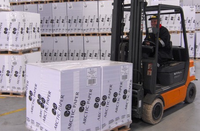 A revised EWC agreement for Arctic Paper, the Swedish-Polish paper manufacturer, was signed on 1 June 2016, at their company headquarters in Poznań. To this day, it remains the only EWC agreement under Polish legislation. The company has its origins in Sweden, but following the acquisition of the paper plant in Kostrzyn on the Oder, the group's management also moved to Poland. Nowadays, Arctic Paper has 1,250 employees in three production sites.
A revised EWC agreement for Arctic Paper, the Swedish-Polish paper manufacturer, was signed on 1 June 2016, at their company headquarters in Poznań. To this day, it remains the only EWC agreement under Polish legislation. The company has its origins in Sweden, but following the acquisition of the paper plant in Kostrzyn on the Oder, the group's management also moved to Poland. Nowadays, Arctic Paper has 1,250 employees in three production sites. New look for EWC after merger
New look for EWC after merger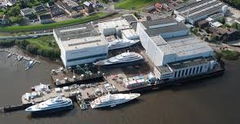 The yacht builder, Abeking & Rasmussen in Lemwerder (near Bremen) has been operating as a SE since 7 March 2016. This family business is famous for custom-built and luxury yachts, it is considered as the "Rolls-Royce" of the industry. Recently the workforce in Germany has grown to 500, which is the legal threshold for codetermination. The SE conversion could be secured just in time, so employee board level representation could be permanently avoided.
The yacht builder, Abeking & Rasmussen in Lemwerder (near Bremen) has been operating as a SE since 7 March 2016. This family business is famous for custom-built and luxury yachts, it is considered as the "Rolls-Royce" of the industry. Recently the workforce in Germany has grown to 500, which is the legal threshold for codetermination. The SE conversion could be secured just in time, so employee board level representation could be permanently avoided. The mail-order company for baby and children products, Windeln.de, which was founded in Munich in 2010 with the support of financial investors, is growing very strongly and getting prepared for an initial public offering (IPO). It currently has 490 employees in Germany. From 500 upwards, one third of supervisory board members would have to be employee representatives. To avoid this on a permanent basis, the conversion to a SE was particularly urgent.
The mail-order company for baby and children products, Windeln.de, which was founded in Munich in 2010 with the support of financial investors, is growing very strongly and getting prepared for an initial public offering (IPO). It currently has 490 employees in Germany. From 500 upwards, one third of supervisory board members would have to be employee representatives. To avoid this on a permanent basis, the conversion to a SE was particularly urgent.
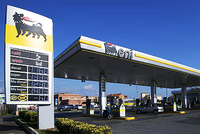 A revised international framework agreement (IFA) for Eni was concluded on 6 July 2016, in Barcelona, between three Italian trade unions, IndustriALL, the Global union federation and central management. This kind of agreement was concluded for the first time in 2002 by the formerly state owned company and has now undergone a substantial improvement in quality. It applies to 33,000 employees in 65 countries around the world. A monitoring committee is established which meets once annually and is made up of five European works council members and five employee representatives from other parts of the world.
A revised international framework agreement (IFA) for Eni was concluded on 6 July 2016, in Barcelona, between three Italian trade unions, IndustriALL, the Global union federation and central management. This kind of agreement was concluded for the first time in 2002 by the formerly state owned company and has now undergone a substantial improvement in quality. It applies to 33,000 employees in 65 countries around the world. A monitoring committee is established which meets once annually and is made up of five European works council members and five employee representatives from other parts of the world.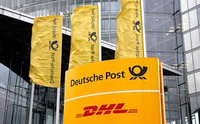 On 19 July 2016, central management of DHL, the German post office's global parcel services subsidiary, signed for the first time a Protocol with two international trade union federations. The logistics specialist with the highest turnover worldwide hereby commits to comply with OECD guidelines and to social dialogue with trade unions even outside of Europe. This includes the right to collective representation in all subsidiaries worldwide. Corporate social responsibility is to apply also to the supplier chain. The agreement provides a mechanism for resolving conflict. For many years the group's management came under criticism for their human resources policy outside of Europe. The management could only be convinced to stop blocking such an agreement through intervention of the German government.
On 19 July 2016, central management of DHL, the German post office's global parcel services subsidiary, signed for the first time a Protocol with two international trade union federations. The logistics specialist with the highest turnover worldwide hereby commits to comply with OECD guidelines and to social dialogue with trade unions even outside of Europe. This includes the right to collective representation in all subsidiaries worldwide. Corporate social responsibility is to apply also to the supplier chain. The agreement provides a mechanism for resolving conflict. For many years the group's management came under criticism for their human resources policy outside of Europe. The management could only be convinced to stop blocking such an agreement through intervention of the German government. Consumer goods group commits to social responsibility
Consumer goods group commits to social responsibility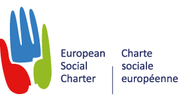 The European Social Charter (ESC), a legally binding international agreement on social rights in the 47 member states of the Council of Europe, has been in force since 1965. All European Member states belong to it except Belarus, the Kosovo and the Vatican. The Social Charter however, was not ratified by Switzerland. The Council of Europe website presents information on the contents of the Social Charter and about current developments on the topic.
The European Social Charter (ESC), a legally binding international agreement on social rights in the 47 member states of the Council of Europe, has been in force since 1965. All European Member states belong to it except Belarus, the Kosovo and the Vatican. The Social Charter however, was not ratified by Switzerland. The Council of Europe website presents information on the contents of the Social Charter and about current developments on the topic.
 Increasing criticism voiced against Brussel lobby groups
Increasing criticism voiced against Brussel lobby groups A new Internet portal provides a comprehensive overview of the history of the German trade union movement over the different epochs since 1830. It was jointly prepared by the Hans Böckler and Friedrich Ebert Foundations. Special topics of interest are also available e.g. on the history of codetermination.
A new Internet portal provides a comprehensive overview of the history of the German trade union movement over the different epochs since 1830. It was jointly prepared by the Hans Böckler and Friedrich Ebert Foundations. Special topics of interest are also available e.g. on the history of codetermination.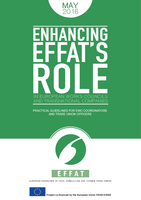
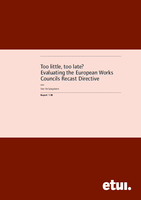 Practical evaluation of the recast EWC Directive
Practical evaluation of the recast EWC Directive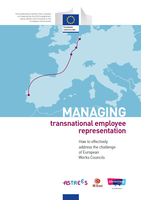 Manual on three key issues for European works councils
Manual on three key issues for European works councils 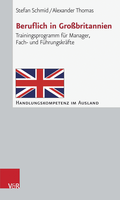 Since the Brexit referendum, nothing has changed in either EU membership or trading. Moreover it is most likely that nothing will change. This makes the intercultural understanding between Germans and English all the more important. This guide, which was published in July 2016, addresses itself to managers. Works councils may also learn a lot from it. It is organized in training modules and illustrates situations which can quickly lead to misunderstandings between the Germans and English. Why is it, that the decision making process in English companies takes place in such a different fashion? Why do the British change the subject, when the Germans are just becoming enthusiastic about it? The book highlights the differences in self-discipline and pragmatism, in the rituals of everyday life and in the workplace, and in the more or less distance in relating with one another. German readers can also learn, when and where a ritualized violation of the rules is tolerated in England.
Since the Brexit referendum, nothing has changed in either EU membership or trading. Moreover it is most likely that nothing will change. This makes the intercultural understanding between Germans and English all the more important. This guide, which was published in July 2016, addresses itself to managers. Works councils may also learn a lot from it. It is organized in training modules and illustrates situations which can quickly lead to misunderstandings between the Germans and English. Why is it, that the decision making process in English companies takes place in such a different fashion? Why do the British change the subject, when the Germans are just becoming enthusiastic about it? The book highlights the differences in self-discipline and pragmatism, in the rituals of everyday life and in the workplace, and in the more or less distance in relating with one another. German readers can also learn, when and where a ritualized violation of the rules is tolerated in England.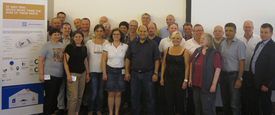 The European works council of TRW Automotive held their plenary meeting from 22 to 24 June 2016, in Kaarst (near Düsseldorf). This US company was acquired by the third largest German automotive supplier, ZF Friedrichshafen, in May 2015 and has its own EWC (see
The European works council of TRW Automotive held their plenary meeting from 22 to 24 June 2016, in Kaarst (near Düsseldorf). This US company was acquired by the third largest German automotive supplier, ZF Friedrichshafen, in May 2015 and has its own EWC (see  EWC training for Anglo-American insurance broker
EWC training for Anglo-American insurance broker The EWC Academy provided training for the enlarged board of Bull's European works council, from 20 to 23 September 2016 in Toulouse. The EWC was already established back in 1988. Bull was the second company in Europe to have established a EWC at such an early stage. The seminar agenda covered industrial relations in EU Member States, an analysis of business figures and a visit to the Airbus site in Toulouse. Bull was acquired by the French IT Service provider, Atos, in May 2014. Bull's EWC is therefore soon to be dissolved and integrated into the Atos SE works council which has been in place since 2013 (see
The EWC Academy provided training for the enlarged board of Bull's European works council, from 20 to 23 September 2016 in Toulouse. The EWC was already established back in 1988. Bull was the second company in Europe to have established a EWC at such an early stage. The seminar agenda covered industrial relations in EU Member States, an analysis of business figures and a visit to the Airbus site in Toulouse. Bull was acquired by the French IT Service provider, Atos, in May 2014. Bull's EWC is therefore soon to be dissolved and integrated into the Atos SE works council which has been in place since 2013 (see  Legal EWC workshop
Legal EWC workshop  9th Hamburg conference for European and SE works councils
9th Hamburg conference for European and SE works councils A seminar is being held for the first time on Chinese industrial relations and intercultural aspects, from 22 to 24 March 2017 in Munich. It is particularly addressed to works councils who have dealings with Chinese investors or those having subsidiaries in China. The seminar will include a site visit to the mechanical engineering company, Krauss Maffei, which was acquired by a Chinese company at the beginning of 2016. The works council will report on their experience.
A seminar is being held for the first time on Chinese industrial relations and intercultural aspects, from 22 to 24 March 2017 in Munich. It is particularly addressed to works councils who have dealings with Chinese investors or those having subsidiaries in China. The seminar will include a site visit to the mechanical engineering company, Krauss Maffei, which was acquired by a Chinese company at the beginning of 2016. The works council will report on their experience. Our annual seminar will be held in Montabaur from 18 to 21 April 2017 (ICE high-speed train station - half way between Frankfurt and Cologne). The following topics are offered in parallel:
Our annual seminar will be held in Montabaur from 18 to 21 April 2017 (ICE high-speed train station - half way between Frankfurt and Cologne). The following topics are offered in parallel: